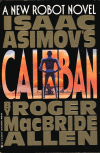I just got a Stumble to Pharyngula’s science blog that has a link to a YouTube video of Isaac Asimov. He is speaking about what he thought the top science story of 1988 was. I like running across videos of him speaking because it is nice to put a voice and face to my favorite author. The video goes out of sync about half way through unfortunately. Check it out!
Via Pharyngula
Isaac Asimov on the Greenhouse Effect
Related Post
Brave New World by Aldous HuxleyBrave New World by Aldous Huxley
My wife was surprised that I had never read Brave New World. It seemed to her that this novel by Aldous Huxley was generally considered required reading in school. She ordered it for me along with 1984 by George Orwell, which by coincidence I haven’t read either. It seems that I somehow went to the wrong schools as a kid, and missed out on some classics. I’m trying to remedy this.
I wouldn’t really call Brave New World a sci-fi novel. It’s more of a criticism of utopian society. The setting is in London around 2540 AD, where society is broken down into castes. Human reproduction is done in a “hatchery” where babies are created in bottles and subjected to varying conditions in order to guide development into one of the five classes (Alpha, Beta, Gamma, Delta, Epsilon). Aside from modifying biological factors, each child is “trained” with techniques ranging from aversion therapy to repeating phrases over and over when they sleep.
Isaac Asimov’s Caliban by Roger MacBride AllenIsaac Asimov’s Caliban by Roger MacBride Allen
I was glad to break into a new series after reading sixteen books with Derec and Ariel as main characters. Roger MacBride Allen brings the robot Caliban to life from “infancy” from when he is first powered up. Caliban awakens with his arm half raised to see the body of a woman laying on the floor, which later turns out to be his creator Fredda Leving. If Caliban was a normal robot he would have sent for help immediately, but unfortunately he was created lacking the infamous Three Laws of Robotics. Instead, Caliban investigates the scene briefly and then ventures out to explore this new unfamiliar world. (more…)
Cobra Strike by Timothy ZahnCobra Strike by Timothy Zahn
I wasn’t sure what to expect from Timothy Zahn after the first book in this series. Johnny, the main character from the first book, now has three sons. The eldest at 27 is involved in politics, just like Johnny. The two other sons are a pair of twins, one which becomes a Cobra. I was hoping that there would be more action, but for the first third of the book I was fairly disappointed. It consisted mostly of political ramblings concerning a very controversial offer that one of the Troft trading partners proposed. They had identified a world near Troft space that was considered a significant threat. If the Cobras could neutralize this threat, the Trofts were willing to give the colony five new worlds. (more…)


